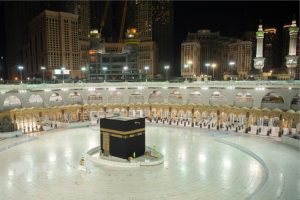Once, during the khilaafat of Hadhrat Umar (Radhiallahu Anhu), the Sahaabah began discussing the personality of Hadhrat Abu Bakr Siddeeq (Radhiallahu Anhu) in the presence of Hadhrat Umar (Radhiallahu Anhu). Hadhrat Umar (Radhiallahu Anhu) was overwhelmed with emotion and wept profusely saying: “How I wish that my entire life’s endeavour …
Read More »Recent Posts
December, 2012
-
22 December
The Hijrat (Migration) – Part 5 – Reaching the Destination
When the Sahaabah (Radiallahu Anhum) heard of Nabi (Sallallahu Alaihi Wasallam) and Hadhrat Abu Bakr Siddeeq (Radhiallahu Anhu) departing from Makkah Mukarramah for the hijrat, they eagerly anticipated their arrival in Madina Munawwarah. Each day after performing their Fajr salaah, they would proceed to the outskirts of Madina Munawwarah, awaiting …
Read More » -
20 December
Sunnats and Aadaab of Miswaak – Part 2
1. In the absence of a miswaak, the finger may be used as a substitute.[1] عن أنس رضي الله عنه قال قال رسول الله صلى الله عليه وسلم يجزئ من السواك الأصابع (التلخيص الحبير ١/١٠٤) Hazrat Anas (radhiyallahu ‘anhu) reports that Hazrat Rasulullah (sallallahu ‘alaihi wasallam) said, “The fingers can …
Read More » -
19 December
Harms of Injustice
The Hadeeth warns us that for every wrong a person will have to face the consequence of it in the hereafter. However, there are two such wrongs that their consequences befall a person in this very earthly life. One is disobedience to parents and the other is zulm (oppression). There …
Read More » -
17 December
Method of Burying the Deceased
1. Once the grave is ready, the deceased should be lowered into the grave from the direction of the qiblah. The method of lowering the deceased into the grave is as follows: The deceased should be brought from the side of the qiblah, and lowered into the grave in such …
Read More »
-
Hazrat Abdullah bin Mas’ood (radhiyallahu ‘anhu) killing Abu Jahl
After the Battle of Badr was fought and Rasulullah (sallallahu alihi wasalllam) and the Sahaabah …
Read More » -
An Interesting Dialogue Regarding the Belief of the Qur’aan Majeed – The Orchards of Love – Part 94
-
The Islam of Hazrat Abdullah bin Mas’ood (radhiyallahu ‘anhu)
-
Rasulullah (sallallahu ‘alaihi wasallam) Praising the Recitation of Hazrat Abdullah bin Mas’ood (radhiyallahu ‘anhu)
-
The Compassion of Allah Ta‘ala – The Orchards of Love – Part 93
-
Receiving Seventy Rewards
Hazrat Abdullah bin Amr bin Aas (radhiyallahu ‘anhuma) reported, “Whoever sends salutations upon Nabi (sallallahu ‘alaihi wasallam) once,...
Read More » -
Increase in Sustenance
-
The Reward of Fasting on the Day of Arafah
-
The Angel that Stands at the Blessed Grave of Hazrat Rasulullah (sallallahu ‘alaihi wasallam) to Convey the Durood of the Ummah
-
Reciting Durood when Entering the Musjid
-
Sunnats and Aadaab when dealing with neighbours – 1
Islam has afforded special rights to neighbours and commanded Muslims to uphold these rights. In …
Read More » -
Sunnats and Aadaab of the Guest – 5
-
Sunnats and Aadaab of the Guest – 4
-
Sunnats and Aadaab of the Guest – 3
-
Sunnats and Aadaab of the Guest – 2
-
Hazrat Umar bin Khattaab (radhiyallahu ‘anhu)
Hazrat Umar (radhiyallahu ‘anhu) is the second khalifah of Islam and the greatest person of …
Read More » -
Hazrat Ali (radhiyallahu ‘anhu) – Part Forty-One – Being Sent by Rasulullah (sallallahu ‘alaihi wasallam) to Level the Graves, Destroy Idols and Erase Pictures
-
Rasulullah (sallallahu ‘alaihi wasallam) Approving of the Verdict of Hazrat Ali (radhiyallahu ‘anhu) – Part Forty
-
The True Ulamaa – Hazrat Ali (radhiyallahu ‘anhu) – Part Thirty Nine
-
Du‘aa for Assistance in Settling Debts – Hazrat Ali (radhiyallahu ‘anhu) – Part Thirty Eight
 Ihyaaud Deen An Effort to Revive Deen in Totality
Ihyaaud Deen An Effort to Revive Deen in Totality



















































































